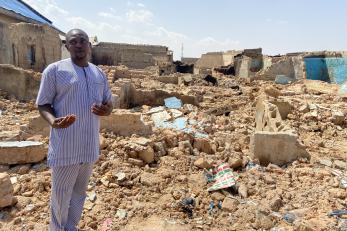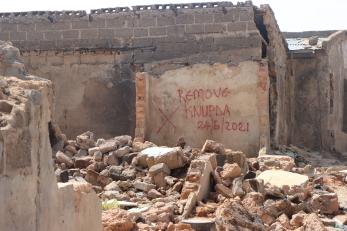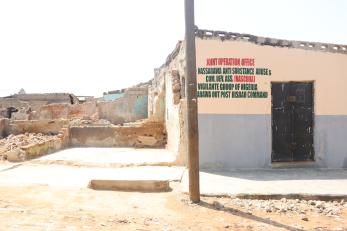How community peace observers are tackling drug abuse and criminality in Kano state

Drug abuse in Kano state
The pervasive abuse of drugs in Kano state is a long running vice plaguing the state. A study conducted by Bayero University, Kano in 2018 cites that 70% of youth in Kano have experimented with or are abusing drugs, and that ages of the addicts range from 12 to 25. The use and abuse of drugs has led youths in the state to partake in criminal and violent acts like political thuggery, armed robbery, sexual assault, rape, etc.
Over the years, traditional leaders, state and federal leaders have spearheaded various initiatives to combat the menace of drug abuse. In 2017, the Senate brought stakeholders to a roundtable to discuss the drivers of drug abuse in Kano, identify the psycho-social and medical impact of the phenomenon, assess current responses, legislative gaps and opportunities for action.
As part of the Early Warning Early Response (EWER) mechanism of the Mercy Corps Community Initiative to Promote Peace (CIPP) program, trained Community Peace Observers (CPOs) across the state identified the pervasive nature of drug abuse in their communities and the role it plays in inter-communal violence, Gender-Based Violence, and other violent and non-violent crimes. To this end, the CPOs implemented various community-led initiatives to address the problem.
CPOs in Badawa Community bring down notorious drug den
Nestled between a church and a security outpost (recently donated by an anonymous philanthropist) lies the ruins of an agangara; a place where drugs, alcohol, and other illicit substances were sold in Badawa community of Nassarawa LGA in Kano state. A mainstay in the community for over 30 years, the agangara was notorious for attracting drug users, a minimum of 100 per day, who would terrorize the community and perpetrate various crimes while under the influence.
According to James Malong, the chairman of Badawa Youth Initiative and a trained CPO with the Community Initiatives to Promote Peace (CIPP), “The agangara has brought a lot of atrocities to the community. People come from other communities to the agangara to take drugs and all sorts. Then from the agangara they will infiltrate the community and attack people in the community by snatching phones, breaking into homes, fighting, and all sorts.”
Agangara as a name is derived from the word gangara in Hausa, which loosely translated means ‘to fall down.’ Reportedly, there is a pit at the back of the agangara where people under the influence of psychotropic drugs and alcohol would lose balance and fall into the pit.
Having had enough of the persistent issues posed by the agangara, James and other CPOs responded as part of the EWER to consult with community leaders and local government representatives to identify a lasting solution to the problem.
Following consultations, the agangara was demolished in May 2021 with approval from the local government authorities. James adds that “with the help of our traditional leaders, religious leaders, and the local government today we can see that the agangara is history and this is now a plus to the community”.

The CPOs also reported mass community support and acceptance of the eradication of the agangara as community members can go about without fear of harassment, theft, or the luring of children into social vices and criminality at an early age.
Understanding that while the eradication of the agangara is a plus, it does not provide a permanent solution to the issue of drug use by those already addicted to these substances. To combat this, Kabiru Bala, the Vice Chairman of the Badawa Community Peace Observers said, “We CPOs collaborated with some community development associations like Nasarawa Anti Substance Abuse & Community Development Association (NASCODA) to conduct a series of community activities to sensitize the youths about the menace of drug abuse and how to help them get out of using drugs. NASCODA also helped to provide rehabilitation assistance to those who indicated interest in quitting drugs.”
In recognition of their work in eradicating the agangara, an anonymous donor donated a joint operation office to serve as a security outpost for peace and security structures within the state that will be managed by the CPOs, NASCODA, Hisbah, and the Vigilante Group of Nigeria.

The CPOs in Badawa look forward to building a secondary school on the site of the former agangara as there is currently no secondary school to serve young boys in the area.
About Community Peace Observers
Community Peace Observers (CPOs) are a part of the CIPP community peace structures and the EWER mechanism that are trained and empowered to identify the early warning signs of violence and provide early responses to relevant authorities to prevent the outbreak of violence. CIPP helps to establish linkages between the CPOs and other existing state peace and security structures to promptly identify, respond, and escalate potentially violent incidents as appropriate.
About CIPP
Mercy Corps is implementing the Community Initiatives to Promote Peace (CIPP), a five-year peacebuilding program funded by the United States Agency for International Development (USAID).
CIPP’s aim is to prevent violent conflict in the most at-risk communities across Katsina, Kaduna, Plateau, Kogi, Kano and Benue states in Nigeria’s North West and Middle Belt regions.
CIPP works with community leaders, women, government officials and state-level actors to improve their ability to peacefully manage disputes; to strengthen Early Warning and Early Response (EWER) mechanisms for timely response to violent conflict, and facilitate collaboration among communities with government agencies, civil service organizations and local leaders to address root causes of conflict.
CIPP is implemented in partnership with Pastoral Resolve (PARE), Interfaith Mediation Centre (IMC), Savannah Centre for Diplomacy, Democracy and Development (SCDDD), and the African Radio Drama Association (ARDA).